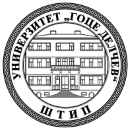SERBIAN AND TURKISH DIRECTIONS OF NORTH MACEDONIAN FOREIGN POLICY: PROBLEMS AND PROSPECTS

Abstract
After declaring an independence Macedonian republic started to lead self-contained foreign policy, which included such important point like relations with neighbouring countries, especially with Serbia and Turkey. “Serbian” and “Turkish” directions of Macedonian foreign policy were as different from each other, but clearly reflected processes took place in Balkans after SFRY collapse.
Macedonian policy towards Serbia for some years depended on actions of Milosevic regime: Belgrad had a hostile attitude on NATO (where Macedonia planned to join) and didn`t recognize an autonomy of Macedonian Orthodox Church. Macedonian-serbian relations got better after falling and arrest of Milosevic in 2000, but Kosovo issue (Skopje recognized its independence in 2008) had a bad impact on them.
“Turkish vector” of Macedonian foreign policy has more stable character due to Turkish attitude on Macedonian country name: Turkey was one of the first nations who recognized constitutional name “Macedonia”. It`s related with traditional anti-greek policy of Turkey. Ankara soon became one of the most important economic partners of Skopje and still stays in this role. Cooperation with Turkey (NATO member state) was important for the Macedonian state in the face of instability in Kosovo. In recent years Macedonian republic planned to join to Turkey in different energetic projects.
Thus, relations with two neighboring states continue to occupy a main position in the foreign policy of North Macedonia in the context of larger processes taking place in the Balkans.
Keywords: North Macedonia, Serbia, Turkey, Balkans, European Union, NATO.
